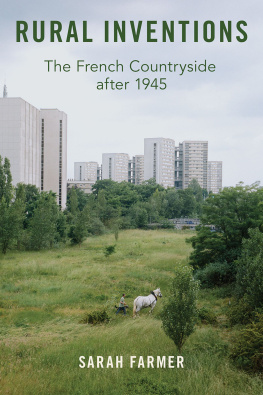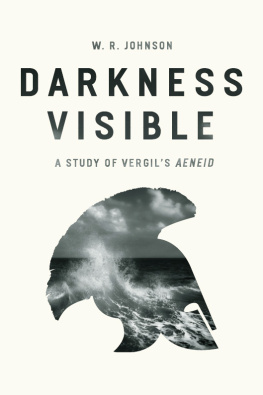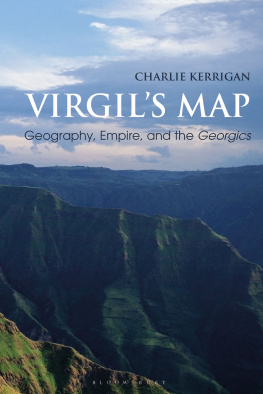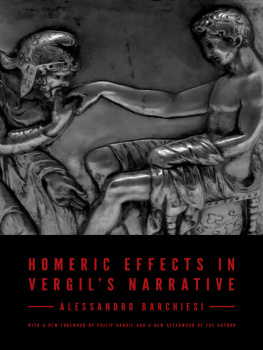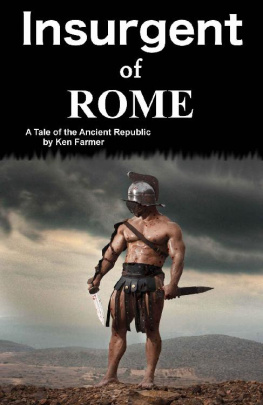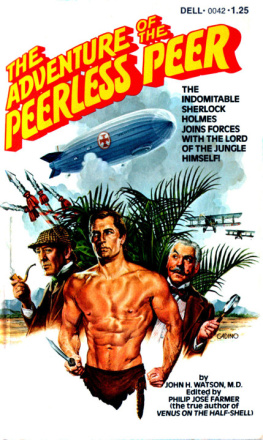
In honor of beloved Virgil
O degli altri poeti onore e lume...
Dante, Inferno
The publisher gratefully acknowledges the generous
support of the Classical Literature Endowment Fund of
the University of California Press Foundation, which
was established by a major gift from Joan Palevsky.
Playing the Farmer
Playing the Farmer
REPRESENTATIONS OF RURAL LIFE
IN VERGILS GEORGICS
PHILIP THIBODEAU

University of California Press, one of the most distinguished university presses in the United States, enriches lives around the world by advancing scholarship in the humanities, social sciences, and natural sciences. Its activities are supported by the UC Press Foundation and by philanthropic contributions from individuals and institutions. For more information, visit www.ucpress.edu .
University of California Press
Berkeley and Los Angeles, California
University of California Press, Ltd.
London, England
2011 by The Regents of the University of California
Library of Congress Cataloging-in-Publication Data
Thibodeau, Philip (Philip J.), 1970
Playing the farmer : representations of rural life in Vergils
Georgics / Philip Thibodeau.
p. cm.
Includes bibliographical references and index.
ISBN 978-0-520-26832-6 (cloth : alk. paper)
1. Virgil. Georgica. 2. Agriculture in literature. 3. Didactic poetry, LatinHistory and criticism. 4. Epic poetry, ClassicalHistory and criticism. 5. RomeIn literature. 6. Allusions. I. Title.
PA6804.G4T48 2011
871.01dc22
2010053842
Manufactured in the United States of America
20 19 18 17 16 15 14 13 12 11
10 9 8 7 6 5 4 3 2 1
This book is printed on Cascades Enviro 100, a 100% post consumer waste, recycled, de-inked fiber. FSC recycled certified and processed chlorine free. It is acid free, Ecologo certified, and manufactured by BioGas energy.
Contents
Introduction
I propped my book open and stared listlessly at the page of the Georgics where to-morrows lesson began. It opened with the melancholy reflection that, in the lives of mortals the best days are the first to flee.
Willa Cather, My Antonia
Outside of the profession of classics, readers who are still on familiar terms with Vergils Georgics are no longer easy to find. It was not always thus: in ancient Rome, emperors, knights, and senators quoted the poem in public, scholars taught it in the schools, and poets of every stripe drew on it for inspiration. Yet ever since then it has languished in relative obscurity. And it is a fair question to ask what, aside from a general shift in taste away from things classical, has been the cause.
One cannot blame the quality of its recommendations: Montaigne, for one, described it as le plus accomply ouvrage de la posie, and John Dryden, in an oft-quoted phrase from the preface to his translation, called it, simply, the best poem by the best poet.
tum quoque marmorea caput a cervice revulsum
gurgite cum medio portans Oeagrius Hebrus
volveret, Eurydicen vox ipsa et frigida lingua
a miseram Eurydicen! anima fugiente vocabat:
Eurydicen toto referebant flumine ripae.
Even then his head, torn from its marble neck, was carried by the Oeagrian Hebrus, rolled in the middle of its seething current; and as the spirit left, his voice and cold tongue all by themselves called out Eurydice, ah poor Eurydice!Eurydice was the echo from the banks all along the river.
Vergil consistently shows himself a master of poetic imagery, his ability to paint a scene evident in lines like these describing a farmers night work (1.29196):
et quidam seros hiberni ad luminis ignis
pervigilat ferroque faces inspicat acuto.
interea longum cantu solata laborem
arguto coniunx percurrit pectine telas,
aut dulcis musti Volcano decoquit umorem
et foliis undam trepidi despumat aeni.
And a certain man stays up at night next to the fire of his winter lamp and with a sharp knife carves torches that look like heads of wheat. As he does so, his wife finds consolation for her long labor in keening song: she runs her whistling shuttle through the threads of her loom, or boils down sweet must to a sap on the fire, using leaves to skim the froth from the surface of the bubbling pot.
The picturesque element is so ubiquitous that one scholar was prompted to invent a new genre for the Georgics, calling it the first pure descriptive poem.
The list of superlatives can be extended in other, more cerebral directions as well. In his influential commentary on the Georgics, Richard Thomas has characterized it as perhaps the most difficult, certainly the most controversial, poem in Roman literature. This difficulty lies not on the surface of the poem (which is not much harder to decipher than Vergils other works), but in its background and depth. Vergil was heir to the full tradition of Greek and Roman poetry from Homer to Catullus, and he enriched nearly every line of his work with literary allusions and other tokens of his learning, encompassing grammar, geography, astronomy, philosophy, and other fields. In its overall density, it can readily stand comparison with works like The Divine Comedy or The Waste Land. That the Georgics can be termed controversial is a reflection of the intense scholarly debate over its basic message and whether the poetic world it projects is fundamentally optimistic or pessimistic in nature, something to be approached with faith or skepticism; here too one can compare the dueling schools of interpretation that surround canonical works such as the Aeneid. This controversy is abetted by the fact that the Georgics is, in formal terms at least, a didactic poem, with something to teach its readersyet there is no end to the controversy surrounding the content of this teaching.
In its aesthetic pleasures and hermeneutic depths, then, the poem presents a number of strong readerly allures. But weighed against these, and surely accounting for a large measure of the poems current disfavor, is the inescapable fact of the poems central subject, farming. Despite certain charms, agronomy is something that typically makes for dry reading, particularly in an instructional context. Discussions of what to plant when or how to wean a calf can be tedious, typically requiring jargon far removed from all polished elegance, as Cicero put it (Fin. 3.4). It hardly bears mentioning that the proportion of readers possessing knowledge of life on the soil has fallen dramatically since the beginning of the Industrial Age (the author making no exception for himself in this regard). For reasons such as these, the subject at the heart of the poem does not always receive the scrutiny that it is capable of bearing. No work of recent scholarship fails to devote at least some attention to the Georgics discourse about farming, yet discussions of the poems higher vision or purpose show a tendency to subordinate the subject to other concerns. My basic aim in this book is to evoke the interest of the Georgics representations of farming and rural life per se.
Doing so will require two efforts. The first is a project of literary and historical reconstruction that will allow us to situate the Georgics within the discourse of agrarianism in ancient Rome. (Agrarianism is a word that can have several different, and often loaded, connotations; in this book I will use it generically to denote any kind of talk about agriculture or life in the countryside.) Despite longstanding trends towards urbanization in Rome and elsewhere in the Mediterranean, Vergil lived in a world that was still predominantly agricultural in its economic and cultural base. The poet was himself a major landowner, writing for an audience of fellow landowners who relied on agriculturally based incomes to sustain lives of business and leisure. Treatises on agriculture and farm management formed a prolific genre, the works of Varro and Cato representing only the small tip of a now-vanished iceberg. And as even a casual perusal will show, the literature and art of the day was saturated with rural and farm-related themes. Most of Vergils contemporaries could discuss the merits of different breeds of horses or varieties of vines, explain how fruits were grafted, or say what tasks were done at different seasons of the year; even if they were not agronomists, landowners knew how to give proper instructions to the subordinates who managed and worked their estates. Farming was not an extraordinary, remote, or abstract theme, then, but an ordinary and familiar institutionso familiar, in fact, that the poet could take enormous liberties with the subject and still make it intelligible to his readers.
Next page

